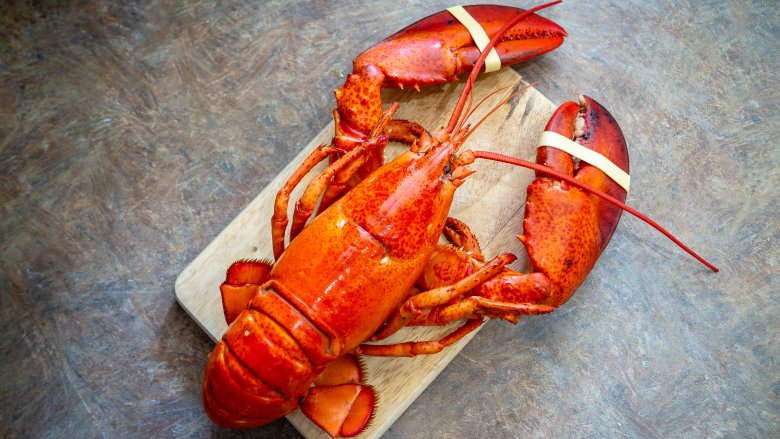Why Does Lobster Have To Be Cooked Alive?
Let's not kid ourselves — the idea that the delicious lobster on your plate at your favorite seafood restaurant spent its last moments of life being boiled alive is rather morbid. Think about it too long and you might just decide that you'd prefer to have a nice piece of tofu instead. But, today, seafood-lovers, you're going to learn exactly why lobsters must be cooked alive, and it turns out there's a very good reason for it. In short, we cook lobsters alive to minimize getting sick from them.
According to Science Focus, the flesh of lobsters, crabs, and other shellfish is full of bacteria that can be harmful to humans if ingested. When shellfish are killed, this bacteria rapidly multiplies and toxins are released that may not be killed off during the cooking process. If eaten, the result is a bacteria that can infect a person with an intestinal disease called vibriosis (via Washington State Department of Health). It usually clears up in a few days, but during that time a person is in for a nasty bout of food poisoning, and they probably won't want to step food in a Red Lobster ever again. Cooking shellfish alive reduces the chances of vibriosis-causing bacteria ending up on your plate.
Now on the the big follow-up question: Do lobsters experience pain? When you boil down the facts — limited as they may be — scientists don't have a lot of clear evidence to make a definite statement that lobsters do or don't feel pain. According to Popular Science, they'll avoid unpleasant stimuli, like heat, but some researchers believe this is merely an instinct to their preference for cold water. Unfortunately, their little prehistoric bodies do seem to register some sense of injury. It's not on the same scale as ours or even other vertebrates, but they do react hormonally and release cortisol — which we also produce — when injured. Scientists know that the tail-flipping of lobsters when being placed in a pot of boiling water is an escape reflex, signaling their distress. It's the lobster's lack of a centralized brain that leaves scientists with a big question mark to whether or not it can actually feel pain.
Some researchers have found that placing lobsters on ice before putting them in boiling water minimizes the tail-twitching, however, placing them in cold water that is brought to a boil has no sort of anesthetic effect. All of the above has led some countries to outlaw the boiling of lobsters and other shellfish alive (via The Washington Post).
Just something to think about next time you get a craving for a lobster roll.
